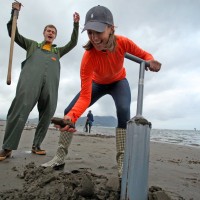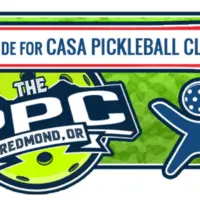
Removing skin from clam’s siphon dramatically reduces arsenic levels
Salem, Ore.- The Oregon Health Authority (OHA) is issuing a health advisory for the length of the Oregon Coast for soft-shell clams because they contain high levels of naturally occurring arsenic.
The advisory is most important for people who dig their own clams and target the specific species Mya arenaria, since these clams are not commercially available in markets or restaurants.
The advisory, issued today by the OHA Public Health Division, recommends removing the skin from the siphon, or “neck,” of soft-shell clams before eating them. Soft-shell clams are found primarily in estuary and intertidal regions of the Oregon coast. This advisory stems from tests the Oregon Department of Environmental Quality (DEQ) performed on a variety of shellfish species collected along the Oregon coast as part of its Water Quality Toxics Monitoring Program.
DEQ’s tests found that when analyzed whole without the shell, soft-shell clams contained unusually high levels of inorganic arsenic. Most of the arsenic was concentrated in the skin covering the clam’s siphon. Researchers found that by removing the skin covering the siphon before eating, the arsenic can be greatly reduced, to levels that are not harmful.
Arsenic levels varied along the Oregon coast: Clams on the north coast had the most arsenic; clams on the south coast had the least arsenic; clams on the central coast were in between.
Those planning to eat soft-shell clams with siphon skins intact should review the OHA’s recommended meal limits, which are available at www.healthoregon.org/fishadv.
Public health officials say that since the arsenic contaminating the clams is naturally occurring, the advisory is likely to be permanent.
By issuing the advisory, health officials hope to increase the public’s awareness of shellfish species to be avoided, those to keep eating, and ways to reduce exposure to known contaminants when possible. While it is important for people to know about contaminants in shellfish, it is equally important to keep shellfish on the table. Health officials continue to encourage everyone to eat a variety of shellfish as part of a healthy diet.
OHA officials emphasize the advisory is about encouraging people to be cautious about certain kinds of shellfish, not all types of shellfish, and to prepare them correctly.
“Because eating shellfish and other aquatic species can be an important part of a healthy diet, we want people to continue eating shellfish,” said toxicologist David Farrer, Ph.D., of OHA’s Public Health Division. “If they plan to consume soft-shell clams, we just recommend they remove the siphon skin before eating them.”
To learn more online about why fish is good for you and get information about fish consumption advisories in Oregon, visit www.healthoregon.org/fishadv.
If you see local news happen, call the Horizon Broadcasting Group News Tip Hotline at 541-323-NEWS, or email us.















